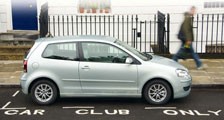Car clubs, which let members drive cars on an hourly rate, are relatively new on the vehicle rental scene but have already made an impact in the business market.
Streetcar has seen its corporate membership increase by 50% in the past three months, with corporate usage rising by 75% in the same period.
City Car Club says business customers have grown from 10% of its total membership 18 months ago to 25% now. This is expected to increase to 40% within the next two years. WhizzGo, another club, already has 45% corporate usage.
So should daily rental companies be nervous about the rise of car clubs?
And what do they offer fleet managers?
Why join the club?
Car clubs tick the environmental box as their fleets are made up of low-emission vehicles.
They also encourage customers to use public transport by having cars parked at train stations.
The idea is for customers to get a train to another city and then pick up a car from the station rather than driving the entire journey.
For local journeys, a customer can walk to a car parked in one of the allocated bays in their neighbourhood, which means no one has to deliver the car.
Parking bays also mean that the cars are available around the clock and there are no reps to meet.
A car can be booked at short notice.
Car clubs also claim to offer fleet managers big savings.
Rather than having to pay for a whole day, a car can be booked for an hour, with prices starting at about £5.
Fuel is included in the price and there are no delivery charges.
For longer bookings, car clubs say their rates are competitive.
For instance, a Volkswagen Golf can be booked on a weekly rate of £195 with Streetcar.
WhizzGo offers value packages for members who are likely to drive more than 10 hours a month.
Customers can buy £250 worth of use, which includes a 15% discount and double the mileage allowance.
However, unlike a rental company, a membership fee has to be paid. Streetcar’s annual membership fee of £99 covers any number of employees.
Daily rental’s plus points
Rental companies have a broader range of vehicles – customers can choose anything from a small runaround to a van.
Streetcar already provides vans, with City Car Club planning to add people carriers and vans this year, but car clubs generally offer business users a more limited choice.
Daily rental companies claim their green credentials are improving.
Many offer hybrids and as their fleets are around six months old they use the latest technology.
Europcar and National now provide CO2 emissions information for their vehicles and a large fleet customer can make a reservation by emissions rather than car group.
Car clubs don’t yet rival rental companies’ network size.
WhizzGo has locations in just 12 cities and most of Streetcar’s locations are in London.
In contrast, Lex can deliver a vehicle and the customer is free to return it anywhere in the country.
One-way trips are not possible with car clubs as the vehicle has to be returned to a parking bay.
The level of management information may not be as developed with car clubs, and it is not viable for them to provide extras like handheld sat-navs as vehicles are left unattended in parking bays overnight.
- Would you consider using a car club or do you use one already? Email fleetnews@emap.com
- To find out more, visit www.carclubs.org.uk
Are car clubs a threat to daily rental?
No
David Alexander, operations director, National and Europcar:
“It’s the same effect as low-cost airlines – they are a perceived threat but they actually grow the market. Their impact is positive. They highlight the benefits of part-time car ownership.
“Europcar doesn’t need to respond as we’ve offered hourly rental for the past seven-and-a-half-years.
“For fleet managers, car clubs are not sufficiently developed to be a credible provider. They’re fantastic for short, local journeys when you return to base.
"They’re not good when you need to do one-way trips, a long journey or use different vehicles. That’s when rental comes into its own.”
No
Ian Drayton, daily rental manager, Lex:
“Hourly rental is not something our customers are really asking for. If you’re in a major city like London or Manchester, car clubs can work but most of our customers don’t rent for one or two days, the average is 12 days.
"We would talk to our suppliers if lots of customers asked us to do hourly rental.”
Maybe
Andy Lewis, head of marketing and e-commerce, Budget Rent-a-Car:
“Car clubs are a good innovation and we’re keeping a close eye on them. We’re still deciding if it’s a sector we want to play in.
"Budget was involved in the very first car club in the early 1990s in Edinburgh, but it was ahead of its time then.
“I think there’s room in the market for car clubs and daily rental; they’re a complementary product to daily rental.
“Logically, I’d say car clubs do take some business from us.”
















Login to comment
Comments
No comments have been made yet.